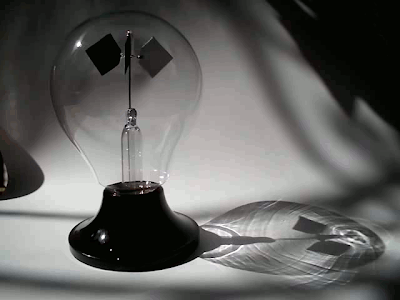A year old, but still waiting for a plausible counterargument.
A Crooke's radiometer measures sunlight intensity, which sounds all scary and scientificy, until you see one in action. It's simpler than a
Talking Elmo.

The more intense the light, the faster the radiometer's vanes spin inside its glass bulb. It looks like a toy.
I keep one on the windowsill in our classroom. On sunny days in September, it spun so hard it rattled. In December's dying light, it moves like an elderly statesman--steadily, slowly, with a hint of what once was.

Sunlight is not abstract. The spinning radiometer is not abstract. Telling my lambs that the sun barely rose 25 degrees above the horizon
is abstract. I can show them fancy solar data charts on the internet, teach them algorithms for interpreting the data, and get them to bark like trained seals.
We need the abstract. I get that. Focusing on the imaginary before children grasp the real, however, will create a generation of idiot savants.
***
Our children live in an abstract world. They bop along life with personalized song sets, immerse themselves in virtual worlds with personalized avatars.
We used to worry when kids held on to imaginary friends a bit too long. A toddler talking to a giant imaginary squid is cute; a 13 year old doing the same thing is disturbing.
Constructing the abstract is a special kind of imaginary thinking, but the abstract is still imaginary. If I describe my Christmas tree, a lovely balsam afflicted with minor scoliosis now covered with ornaments, some made by hand by my children years ago, I am talking about something real.
If I tell you that the average balsam sold in Bloomfield this year is 2.11 meters tall, weighs 20.3 kg, and has 533.7 branches, you might be able to imagine it in your head, but it does not exist. Anywhere.
Yet when we teach science, we focus on the imaginary average, often at the exclusion of looking at the bent-over balsam sitting in the room.
Using a machine that helps a child grasp the abstract version of a Christmas tree may improve test scores (though there's evidence that it won't); it cannot, however, help a child see the real tree.
***
There is a huge push to use "technology" in classrooms. By technology, I am assuming most folks mean the digitized high-tech expensive stuff, or else the discussion is just silly. All of us use some sort of technology in class, even if it's just paper and pencil.
The Innovative Educator blog is a fun read, with lots of good ideas. It has almost 1800 followers. It carries clout. A few days ago, Lisa Nielsen,
The Innovative Educator, headlined her post:
Tech Doesn’t Make Us Illiterate.
Not Embedding it Into Instruction Does.
In it, she discusses reactions to
The New York Times article discussing the failure of 1:1 computing in some schools, then reconstructs the false dichotomy tossed about in the ed tech world: tried-and-true old skool ("readin', ritin', rithmetic") vs. the visionary new big thing.
What gave me pause, however, is her suggestion that we turn classrooms into video games:
What would happen if rather than lament what our kids loved to do, we re-envisioned school. They love games. What if we stopped fighting it and the adults changed and started looking at School as Video Game?
Ms. Nielsen does not stand alone. I read similar words every few days, hers just happened to be the latest I stumbled upon.
What would happen?
Science in the classroom would die. Science requires contact with the physical, with the real. Until children know the ground under their feet, they cannot hope to grasp models.
I use plenty of technology in class: our Crooke's radiometer, our Drinky Bird, our Newton's Cradle, our classroom garden
(hey, we even use fluorescent lights!), our prism, our aquaria filters...and on and on.
I agree with Ms. Nielsen that tech doesn't make us illiterate. Embedding digital technology into science too early, before our children get a decent handle on the physical world,
does make our children scientifically illiterate.
It's why my class has an analog clock. It's why I threaten to smash calculators in class.
Do I use a computer? Yep. Sometimes I sip a good Oirish whiskey as I do so. Neither belongs in the hands of a child.
Radiometer pic by Nevit Dilmen, used under CC.
The cost of one laptop buys a lot of tangible science gadgets.
Bet a young student learns more science from a bag of magnets than from a puter. .














